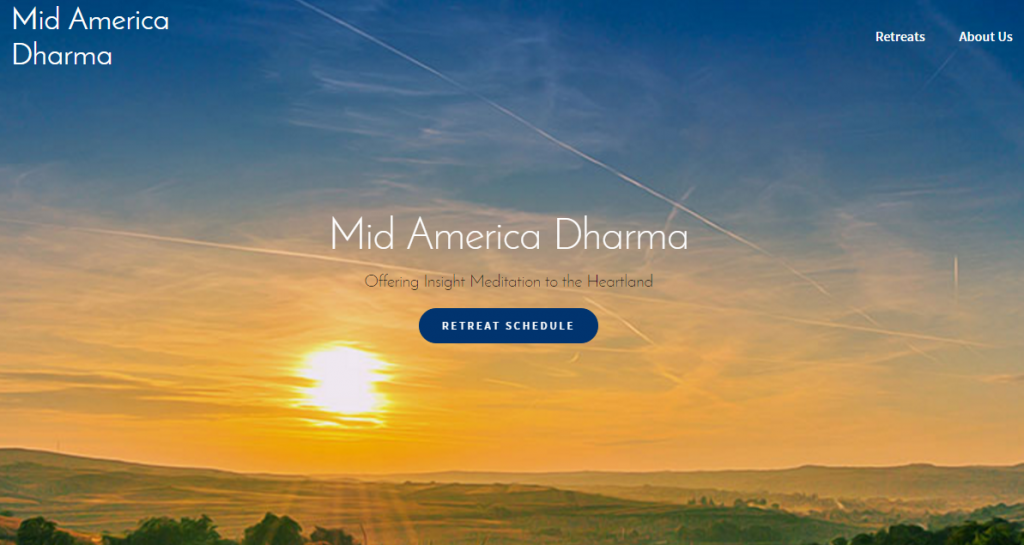When the Plain World Comes
Tomorrow is my birthday. In anticipation of which, my attention turns to:
The Other Earth
by Jane Hirshfield
At first we embrace trees.
Lie with the swan, the bull, become stars.
Blackbirds form bridges across the sky:
we pass, lightly placing our feet.
The god enters our rooms in a shower of gold.
Into the intricate maze a white thread,
a woman, a fish come to guide our way out.
Docile as horses, we go.
When the plain world comes,
with its explanations
smooth and cool as a marble statue’s skin,
we go, rising out of the dark.
Being careless and proud, we look back
towards the other earth:
how it wavers and goes out,
like a girl with an errand to do in another room.
I Bring to Mind and Invoke
Another one of Ajahn Sucitto’s talks that’s having a big impact on me is the one from the last night of the retreat, titled: Establishing the Temple, in which he talks about the importance of making a space that can help create a “field of practice.” By which he means establishing a “theme” in the mind — a certain boundary of attention (non-harming, for example) — so that whatever arises in awareness, one can bring it into this field.
He talks about the use of ritual to “potentize” this field of practice, to solemnize it, to give a little more weight to it…to embed it more fully by expressing it as an outward form. One of these rituals is the practice of paying homage to the Buddha, the Dhamma, and the Sangha:
“I bring to mind and invoke the Buddha, the awakened one, the one truly awakened by himself…through the courage to go out on his own, through the resilience and the resolve to keep practicing — no matter what — and through his penetration to the truth. I wish to bring Buddha to mind in this respect. I wish to bring, invoke the Buddha as the one who, moved by compassion, spent his entire waking life teaching, instructing, encouraging others for their welfare. I wish to bring to mind and invoke the Buddha as someone who had the gifts to be able to express this subtle and profound teaching in worlds that we can still make use of. And so bringing the Buddha to mind, I also acknowledge my ability to bear such a thing in mind, and to receive blessings of the Buddha.
“I wish to bring to mind and invoke the Dhamma, the truth of the way things really are, revealed by a Buddha — taught in words, modeled in deeds, exemplified, penetrated by view. Dhamma that is immediate, accessible, inviting me inwards and encouraging me to reveal through my own efforts, through my own wisdom. I wish to bring to mind and invoke the Dhamma, which produces harmony, welfare, and liberation. I wish to bring to mind and invoke the Dhamma, which is persisting to this day and taught to this day, and which I aspire to realize for myself.
“I wish to bring to mind and invoke the Sangha, those who have practiced well, those who have practiced directly, those who have practiced with insight, those who have practiced with integrity through thousands of years — many different personalities, many different characteristics — who have struggled and worked and followed the pathway of the Buddha. And who are still present in this day and age. I wish to bring to mind and invoke any members of that extended community of practitioners who I know, who I read about, who act as models for my behavior. I wish to bring to mind and invoke Sangha so that I may also see myself as part of that community of followers.
(He says this so beautifully, it feels like a blessing.)
He also talks about the practice of making an offering to this field. “By my act of offering, I’m entering into, contributing, participating in this field that we can all bear in mind.” He talks about the symbolism of these ritual offerings and the qualities they represent: Flowers for integrity/virtue/sila; Candles for discernment/clarity/seeing; Water for kindness/compassion; and Incense for samadhi.
***
His words are lovely. But what touches me the most is the unmistakeable depth of feeling they express. Reading doesn’t do it justice. Listen to him here.
How to Have Harmonious Relationships
I’ve been listening again to another of Ajahn Sucitto’s profound-and-useful talks, this one given near the end of the November retreat, in which he describes how to bring what we’ve learned during retreat practice directly into our lives outside of retreat — especially in how we engage in relationships both at home and at work.
He says: One of the first principles is that instead of “I want it this way,” or “I want it that way,” or “It shouldn’t be like this..” — just unhook, step back, and ask “How is this?”
Look for what activations are occurring. Do I feel fed up, dismissed, irritated, happy, worried, concerned….? Hmmmm…. Then ask: How do I find harmony with that? Where does harmony occur with that?
Widen the field. Feel it in the body. Hmmm….”It’s like this now. Feels like this now.”
This is not stepping out of the field. It’s staying within it, but just disengaging one’s wishes and preferences. “It’s like this now. I’d like it to be like that, but it’s like this.” Hmmm. “How is that?” Can one sustain that, and see what that brings up. What shifts that allows. When we come to that place of disengage — not dissociate — but just lift, then, can we ask: “What’s helpful here? What’s helpful here that allows harmony?”
Maybe taking one’s time. Maybe being more patient. Maybe just — a little more generosity of heart. Maybe just a little more groundedness in the body. Maybe just a little more openness, of acceptance of differences.
***
This is just the beginning. He also talks about having very clear boundaries, not taking on other people’s issues, etc. I’ve listened to this talk over and over. And it’s been helpful to me — over and over. He talks about “fields” and “potencies” and “differentiation,” but that’s just language. This is not a theoretical talk. It is very, VERY practical.
From My Heart to The Heartland
The new Mid America Dharma website (that I’ve been art directing, shepherding, arm-wrestling over and putting my heart into for more than a year now) is UP and RUNNING!!!! There will be an official announcement sent by email tomorrow to the greater MAD sangha. But I just couldn’t keep it a secret. Check it out!
In This World of Nature
The news. I want to stay informed. But sometimes it’s just too much. Still, things are as they are. It does not help to look away.
from Appalachian Elegy
by bell hooks
35.
winds of fate
take the air
push it past the known
in this world of nature
no one can undo
mystery abounds
harsh cold burns skin
fire waits
raging tempests
sweep us
carry us toward
destiny recorded
written down
past present future
change comes
Simplify. Get More Comfortable.
I’ve been listening to the talks (there are 43 of them!) from Ajhan Sucitto’s recent month-long retreat at the Forest Refuge. They’re terrific. Some of them I’ve listened to more than once, including this one: Samadhi — Absorbing the Sweet Spot.
“Happiness and ease are the forerunners of samadhi,” he says. Many people find it really difficult to access these qualities because as Westerners, we tend to get intellectual/conceptual/”notional” about the process of mindfulness and mediation.
So he likes to give a very different kind of instruction.
He says: Let the body teach you about mindfulness. Let walking teach you about mindfulness. Let eating teach you about mindfulness. Let sitting teach you about mindfulness… The body is where there is direct wisdom that knows: this is stress. [sigh] And there’s the release from that. This is what we want to know. Thinking mind can’t know that because it can always conceive of a stress, of a should, or a could, or of whether I match up to the standard. It will always be doing that… It can not realize the end of stress. And realization is what it’s about.
He suggests instructions that are non-technical: “Put aside what you don’t need. What you feel you need, stay with that for awhile and then after that, see what else you can put aside…..
Simplify is one instruction.
The other instruction is: Get more comfortable.
Put aside the topics that are going to make you more uncomfortable… Attune to qualities that are going to give you a sense of comfort and contentment. Self respect. Bearing in mind one’s skillful action, one’s skillful companions, one’s warm relationships, one’s love…. Just bear it in mind. Drink it in. Drink in the beauty of it…
***
Try it.
(And definitely listen to the talk. Click here.)
The Gift of Wise Speech
At our Dharma Book Group last night, we discussed the chapter on Wise Speech in Jospeh Goldstein’s Mindfulness: A Practical Guide to Awakening. We were sitting by the fire, in front of a lovely Christmas tree (thank you, Anne), so it seemed fitting to talk about Wise Speech as a Generosity practice.
What is Wise Speech?
It is spoken at the proper time; what is said is truthful; it is spoken gently; what is said is beneficial; it is spoken with a mind of lovingkindness…One speaks at the right time, in accordance with facts, speaks what is useful, speaks of the Dharma…One’s speech is like a treasure, uttered at the right moment, accompanied by reason, moderate and full of sense.
When we lie, we are usually trying to hold on to something — to power, to a view of ourself, to whatever we fear we will lose if we told the truth. When we speak harshly, we’re doing the same thing. Same when we gossip or say something malicious or divisive. Or when we just go on blathering about something that’s of no use or interest whatsoever…whose only purpose is to try to prop up our fragile sense of self. This is grasping. It’s not helpful. It’s not even pleasant!
So dear reader, my gift to you — and to the world — is the intention to practice honesty and goodwill by not speaking (or writing) in ways that are false, harsh, divisive, or mindless.
It’s a gift to you; but it’s also a gift to myself.
Pass it on.
This is Good; This is Bad
As part of the homework for the “Waking Up White” work I’ve been doing, I listened (again) to a terrific talk by Thanissara, which — in addition to an impassioned call to Reclaim the Sacred lost through colonialism, racism, domination of nature and repression of the feminine — includes an interesting anecdote about the first time she heard Ajahn Chah give a dharma talk.
Thanissara says that she was on her first retreat ever, where the practice was a very strict style of Burmese meditation, taught by a Burmese master (who didn’t speak any English). She was having quite a hard time of it, so about half-way through, she decided to sneak out of the retreat center to go listen to a talk being given at Oxford by a Thai master who she’d heard was very powerful, very free and very direct — Ajahn Chah. (He didn’t speak any English either, but at least there was a translator!)
Thanissara says that this was the first time she had actually heard the Dharma and as Ajahn Chah was talking, she was thinking: This is really, really good.
Then at the end of the talk, he said: If you’ve been sitting here thinking “This is good” or “This is bad,” you have really been listening.
(So then, of course, Thanissara thought: Wow, that’s really good!)
OK, I won’t say the talk is good. Or bad. I’ll just say: Listen to it! (here)
Not Comfy for Long
 My natural inclination, especially when confronted with the state of the world right now, is to find some nice, comfy corner of my mind and sleep in.
My natural inclination, especially when confronted with the state of the world right now, is to find some nice, comfy corner of my mind and sleep in.
But that’s just an old habit.
Besides, I know from experience that nice comfy corners tend not to stay nice and comfy for long.
I’d rather wake up.
If you would too, I highly recommend listening to this talk: Engaged Dharma in a World on Fire. It was given by Kitissaro and Thanissara back in March of 2015, but it’s still relevant — maybe even more so now than back then!
To Pass from Entanglement to Peace
The topic for tonight’s “Let’s Talk” Dharma Discussion is Wise Intention, which doesn’t get a lot of “air time” at drop-in meditation groups, probably because what it means is to cultivate the intention to practice Lovingkindness, Compassion, and Renunciation. Just mentioning the word “Renunciation” is often enough to send people heading for the exit! (Mentally, if not physically.)
But here’s what Bhikkhu Bodhi has to say in his excellent little book, The Noble Eightfold Path:
“Desire is to be abandoned not because it is morally evil but because it is the root of suffering. Thus renunciation, turning away from craving and its drive for gratification, becomes the key to happiness, to freedom from the hold of attachment.
“…To move from desire to renunciation is not, as might be imagined, to move from happiness to grief, from abundance to destitution. It is to pass from gross, entangling pleasures to an exalted happiness and peace, from a condition of servitude to one of self-mastery. Desire ultimately breeds fear and sorrow, but renunciation gives fearlessness and joy…
“When we methodically contemplate the dangers of desire and the benefits of renunciation, gradually we steer our mind away from the domination of desire….
“Real renunciation is not a matter of compelling ourselves to give up things still inwardly cherished, but of changing our perspective on them so that they no longer bind us. When we understand the nature of desire, when we investigate it closely with keen attention, desire falls away by itself, without need for struggle.”
***
People always want to talk about giving up chocolate when the topic of Renunciation comes up, but I don’t think it’s about giving up something delightful because someone says it’s not “good for you.” What I’ve found instead that it’s about letting the shackles fall away when you realize that what you’ve been doing (thinking, saying,…OK, eating, etc) is not really working for you!!!









